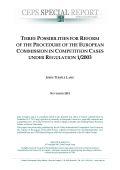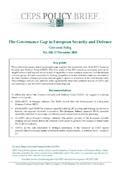Alcidi, C., Giovannini, A. & Piedrafita, S. (2014) “Enhancing the Legitimacy of EMU Governance“, Economic Policy, Politics and Institutions, Centre for European Policy Studies (CEPS) Special Reports, 18 December. This CEPS Special Report investigates ways to enhance the legitimacy of economic governance in the Economic and Monetary Union (EMU) without introducing Treaty changes. It suggests changes in the governance framework at both the institutional and economic level. Input-oriented legitimacy …Read More
ECJ legal rulings designed to help the Eurozone are threatening the accountability of European governance
Beck, G. (2014) “ECJ legal rulings designed to help the Eurozone are threatening the accountability of European governance“, LSE EUROPP, 10 December. One of the most controversial issues during the Eurozone crisis has been the extent to which policies aimed at resolving the crisis, such as the decision by the European Central Bank to adopt ‘Outright Monetary Transactions’ (OMT), comply with EU law. Gunnar Beck writes that the European …Read More
The European Union Is the Global Laggard on Basel III – the Basel Committee found the EU “materially non-compliant” with Basel III
Véron, N. (2014) “The European Union Is the Global Laggard on Basel III – the Basel Committee found the EU “materially non-compliant” with Basel III“, Bruegel Institute, 08 December. On Friday, December 5, the Basel Committee on Banking Supervision published its reports on the compliance of rules adopted last year in the European Union and in the United States with its global accord on banking regulation, adopted in 2010 …Read More
Τhe Sense and Nonsense of Eurozone Level Democracy
Verhelst, S. (2014) “Τhe Sense and Nonsense of Eurozone Level Democracy“, Egmont Paper 70, Royal Institute for International Relations, October. EXECUTIVE SUMMARY The democratic functioning of the EU is frequently called into question. Increasingly, the focus of this criticism is the perceived lack of legitimacy in eurozone policy-making. The eurozone has gained a firmer grip on national policy-making in recent years, but has not adapted its democratic structure to …Read More
Europe: When the Unthinkable Becomes Possible
Europe: When the Unthinkable Becomes Possible, Geopolitical Diary – STRATFOR Global Intelligence, 03 December. Europe’s economic crisis is slowly but steadily eroding the political systems of many countries on the Continent. New actors are emerging and threatening the supremacy of the traditional players. Alliances and events that seemed impossible only a few years ago are now being openly discussed across Europe. On Dec. 3, for example, Sweden announced it …Read More
Investment as the key to recovery in the euro area?
Gros, D. (2014) “Investment as the key to recovery in the euro area?“, Economic Policy, CEPS Policy Briefs Νο. 34, 18 November. Investment has declined in the euro area since the start of the economic and financial crisis, but this does not mean that there is necessarily an ‘investment gap’, explains Daniel Gros in this CEPS Policy Brief. Investment was probably above a sustainable level due to the credit …Read More
The European Commission’s stronger role in economic governance has made it an unexpected ‘winner’ from the Eurozone crisis
Bauer, W. M. & Becker, S. (2014) “The European Commission’s stronger role in economic governance has made it an unexpected ‘winner’ from the Eurozone crisis“, LSE EUROPP, 02 December. Several commentators have argued that the Eurozone crisis has resulted in more intergovernmental EU decision-making, with the European Commission in particular being weakened by the role taken on by the European Council in the area of economic governance. Michael W. …Read More
The loaded language of austerity – but all the sinners are saints!
Mitchell, B. (2014) “The loaded language of austerity – but all the sinners are saints!“, Bill Mitchell Blog, 27 November. The US National Institute of Justice tells us that – Recidivism is “is one of the most fundamental concepts in criminal justice. It refers to a person’s relapse into criminal behavior, often after the person receives sanctions or undergoes intervention for a previous crime”. You know murder, rape, theft, …Read More
Two speeches on Europe, half an idea
PoliticsatSurrey & Simon Usherwood (2014) “Two speeches on Europe, half an idea“, Politics at Surrey Blog, 27 November. It’s that time of year when people apparently decide they need to talk about ‘Europe’: this week we’ve seen two good examples of why this might not be such a good idea. The first, made by former British agriculture minister, Owen Paterson, to the eurosceptic lobby Business for Britain, came on Monday. …Read More
The Consequences of Imposing Negative Interest Rates
Tenebrarum, P. (2014) “The Consequences of Imposing Negative Interest Rates“, Acting Man Blog, 21 November. Negative Interest Rates and Capital Consumption Ever since the ECB has introduced negative interest rates on its deposit facility, people have been waiting for commercial banks to react. After all, they are effectively losing money as a result of this bizarre directive, on excess reserves the accumulation of which they can do very little …Read More






